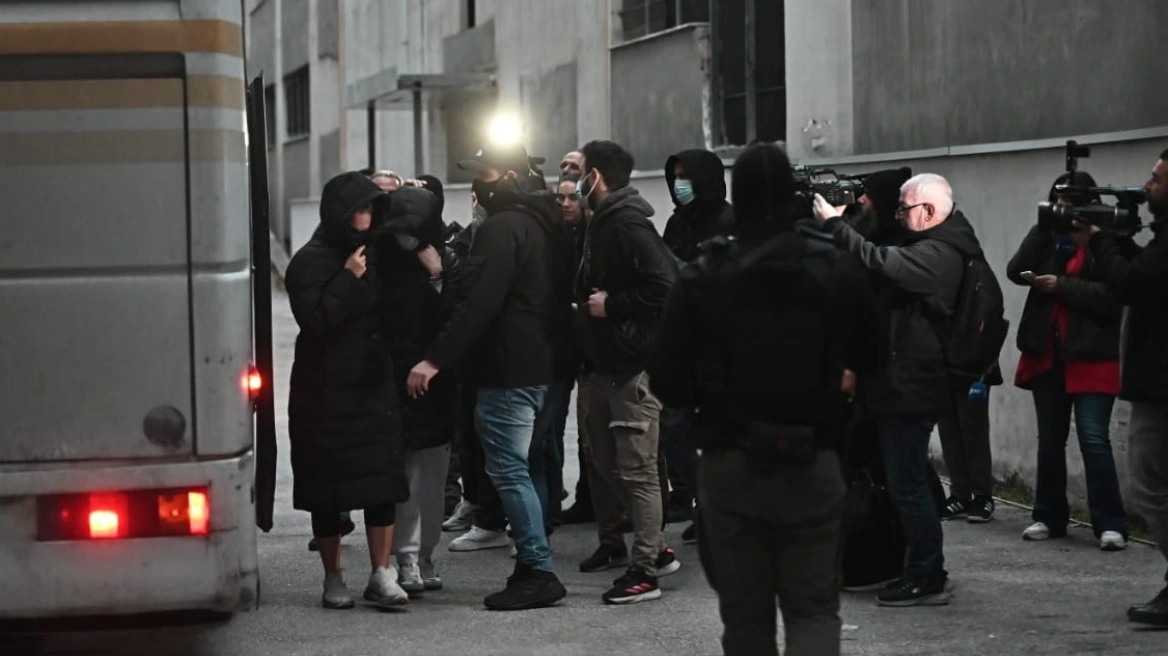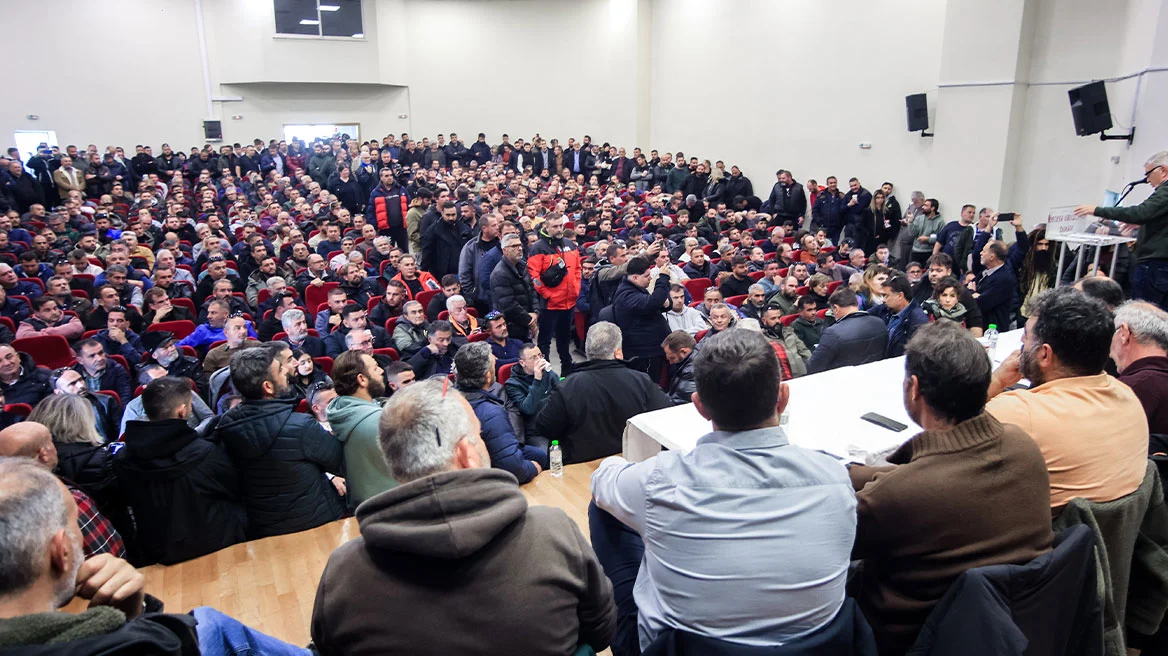Four families are climbing a steep hill with a common point of reference: the 424 Military Hospital in Thessaloniki. A series of medical errors has already led a 27-year-old soldier to death, a police officer down an irreversible path, and two young women to a state of disability, raising one essential question: What is happening at the military hospital?
The chain of revelations began with the case of 27-year-old soldier Nikos Gatsis, whose death was brought to light by “THEMA” last April.
The second shock was the revelation of the case of sub-inspector Thomas Pouliopoulos, who was informed a year late that the biopsy he had undergone in December 2022 had shown cancer. When he learned this from the doctors at the 424, it was practically too late to do anything to save his life.
424 Thessaloniki Military Hospital: Unforgiving Questions After the Death of a 27-Year-Old and Two Disabled Women
The third link in the chain is the 50-year-old woman from the Aridaia area, who after a total thyroidectomy now breathes with mechanical support and has lost her voice. During the surgery, described as “routine,” nerves and vocal cords were severed.
The fourth case involves a 42-year-old military woman from Larissa, who also underwent thyroid surgery to treat papillary carcinoma. Both women were operated on by the same doctor, and the man who performed the surgery on soldier Nikos Gatsis has since left the Military Hospital.
Legislative Intervention
The continuous revelations have greatly alarmed the Ministry of Defense, and alongside the internal inquiry requested by Minister of Defense Nikos Dendias, legislative amendments are being promoted to address the issues that have already been identified. According to reliable sources, the explanations provided by the hospital for the unreasonable delay in the biopsy of the 55-year-old sub-inspector are that the staff is insufficient, with claims of a heavy workload also being raised.
However, while the 424 performs about 900 biopsies a year (about three per day), a large private hospital performs 3,000 biopsies annually without such life-threatening delays. As part of an upgrade to the safety framework for patients in military hospitals, a Medical Services Quality Index is expected to be established, and these hospitals will also be supervised by the Health Quality Assurance Organization, ODISY S.A.
Military sources pointed out to “THEMA” that, practically and essentially, military hospitals are not adequately controlled. For this reason, legislative provisions are being promoted, which are expected to be enacted in the near future, and will include significant changes in the supervision of military hospitals, which, by general consensus, are considered to be good healthcare facilities. However, answers regarding what is happening at the 424 in Thessaloniki are still awaited from ongoing investigations by military authorities.
And while in the case of the 55-year-old sub-inspector, it was the biopsy, which was delayed for an entire year, that made the cancer untreatable, in the case of soldier Nikos Gatsis, the forensic investigation into the causes and mechanism of his death was completed and entered into the case file ten months after the young, promising man passed away.
424 Thessaloniki Military Hospital: Unforgiving Questions After the Death of a 27-Year-Old and Two Disabled Women
27-year-old soldier Nikos Gatsis died from internal bleeding in the ward where he had been hospitalized, three hours after undergoing surgery to treat thyroid cancer.
The Fateful Surgery
The father of the soldier, Aris Gatsis, a Physics professor from Karditsa, who has made it his life’s mission to vindicate his child’s memory, took a deep breath last September when he received the report from the public forensic expert, which effectively confirmed that his son had died due to medical errors.
The conclusion of the forensic report by Ms. Aspasia Deliligka, which was added to the case file on September 5, 2024, ten months after Nikos Gatsis’ death, is as follows: “From the above, it appears that the body of Nikos Gatsis shows the aforementioned injuries within the framework of the surgical procedure for the treatment of thyroid cancer. The death was caused by a cervical hematoma, resulting from the rupture and bleeding of vessels in the area.”
This conclusion was essentially the same as that of the forensic pathologist and technical advisor to the family, Dimitris Galenteris, who had determined that Nikos Gatsis died from internal bleeding. Specifically, it was found that a vein was double-clamped, while an artery was cut and not even sutured. What’s even more unthinkable in this case is that the forensic report had been pending for ten months because the government had no contract with a specialized laboratory for histological and toxicological tests.
Tissue samples from the young soldier remained in a refrigerator, along with countless others, while answers were urgently needed to resolve similar cases in court. The internal investigation into how Nikos Gatsis’ death occurred is being conducted by the Trikala Military School (SMY), the unit where the 27-year-old was serving his military service.
“They had convinced us it was a routine surgery and that the 424 was excellently equipped, with the best doctors,” says Mr. Gatsis to “THEMA.” His son came out of surgery, and they were informed that everything had gone well. He was placed in a regular ward, and three hours later, he died, suffocated by his own blood.
The Nightmare of a 42-Year-Old
The publication of the case by “THEMA” caused a 42-year-old military woman from Larissa to relive the nightmare she experienced in the summer of 2021 at the 424 Military Hospital. The lawyer’s recounting of what happened to her at that time mirrors exactly what Mr. Gatsis described regarding his son’s case.
Spyros Chatzis, the lawyer for the military woman, describes how his client, a mother of a 13-year-old child in 2021, entered the hospital for surgery to treat papillary thyroid carcinoma and left two months later, having come close to death many times: “When the diagnosis was made in Larissa, the military doctor recommended either the 424 in Thessaloniki or the 401 in Athens. She chose Thessaloniki because it was closer to Larissa.”
Everyone told her the surgery would be simple — remove the carcinoma, and she’d be done, ready to return to her child, to her life. Two weeks after the diagnosis, the surgery was scheduled. Due to her insistence, she underwent a CT scan. When the surgery was completed, the initial update to her mother, who was waiting outside the operating rooms, was that everything had gone well. However, later she was told that her daughter “wasn’t waking up.”
Three days passed, and the woman hadn’t opened her eyes. As the family reports, the surgeon had immediately left for his summer vacation after the surgery. Three days after the surgery, on July 19, 2021, the mother was asked to sign for her daughter to undergo a tracheostomy. The woman spent 15 days in the ICU and was then moved to the High Dependency Unit. “Today, the young woman speaks by chance and after a full year of speech therapy,” says Mr. Chatzis, explaining, “She underwent a tracheostomy because her airways were blocked.”
In the surgery, lymph nodes were damaged, causing lymphatic fluid to collect in the lungs. She underwent surgery to have bilau tubes placed in both lungs, which, according to the hospital, drained up to one liter of fluid daily, though the mother says it was actually 4 to 4.5 liters. One key question the woman’s lawyer now poses is whether the hospital used neuro-monitoring materials during the surgery, which would make such procedures safer.
According to the military woman’s family, she endured two months of terrifying hospitalization during which she came close to death several times. During this period, the woman feared whether she would ever see her child again, and whether her child would see her again. Her mother had urged her to take legal action from the very start — after all, the road to recovery proved to be long and difficult. The military woman had decided not to pursue the case, although she had reached out to her lawyer, Mr. Chatzis, early after leaving the hospital.
“The case was practically dormant,” says the lawyer, “until she read about Nikos Gatsis’ death in ‘THEMA.’ That’s when she decided to take legal action, filing a lawsuit for moral damage under Article 932 of the Civil Code and Article 931 for causing disability or disfigurement — the woman has a tracheostomy.” The condition she developed was attributed to damage to the laryngeal nerve, which was explained as a situation not uncommon in delicate surgeries.
While the military woman fought for her life, doctors at the hospital, according to her family, suggested her condition was due to… drug use, only to later retract their statements, mentioning the complications that are possible in a surgery like the one she underwent — complications no one had warned her about before the procedure.
Breathing mechanically
For what was described as a simple surgery, a fifty-year-old woman from the area of Aridaia was admitted to the 424 Military Hospital last February. Today, the woman breathes with mechanical support and has lost her voice, as during the surgery for a total thyroidectomy, nerves and vocal cords were severed, as described by the family’s lawyer, Nikos Kontakos, in “THEMA”: “As a result of what happened during the surgery, the woman stopped breathing and ultimately had to undergo a tracheostomy.”
She is now expected to undergo further surgeries aimed at regaining the ability to breathe on her own, while in her case, everything has been attributed to possible complications from such a procedure. The family has now turned to the courts.
Ask me anything
Explore related questions





